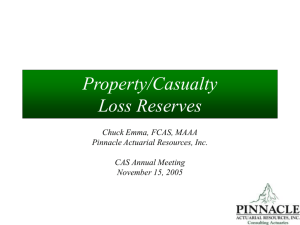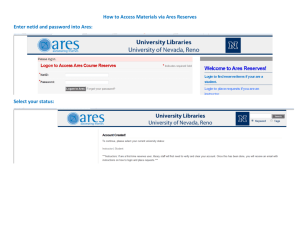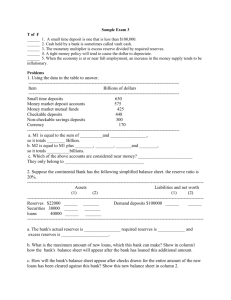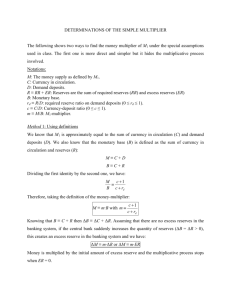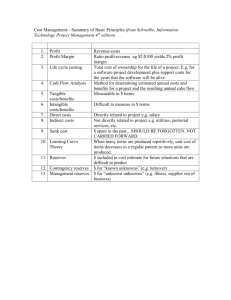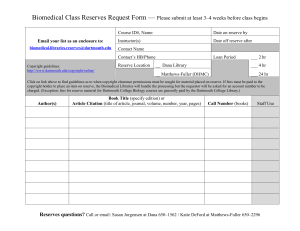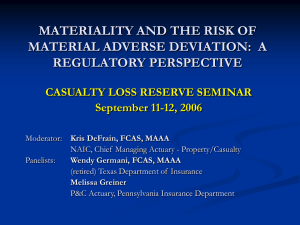SAFECO Emblem Presentation - Casualty Actuarial Society
advertisement
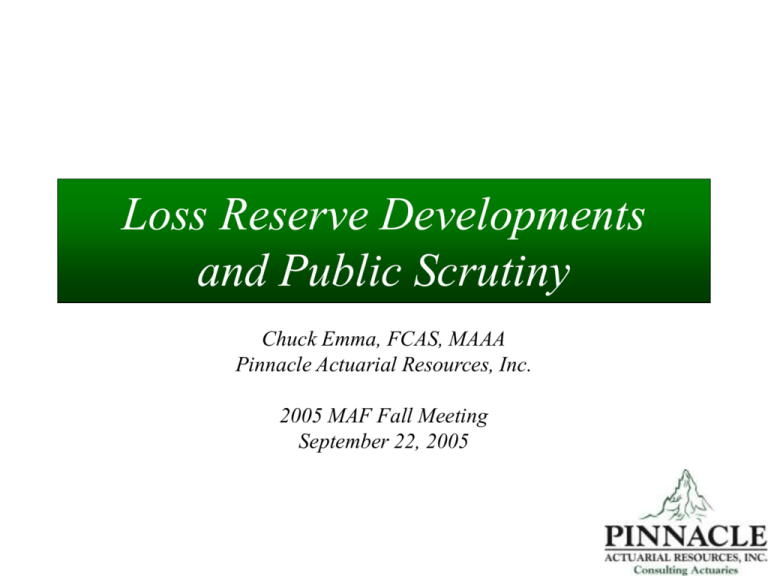
Loss Reserve Developments and Public Scrutiny Chuck Emma, FCAS, MAAA Pinnacle Actuarial Resources, Inc. 2005 MAF Fall Meeting September 22, 2005 Background • Failures/Impairments/Downgrades • Public scrutiny • Concerns over the profession’s image • Nov. 2003 S&P Article • 2002-2004: Total industry reserve developments adverse to the tune of $45 Billion Framing the Scrutiny Who is saying what and why do they care? • “Actuaries are signing off on reserves that turn out to be wildly inaccurate.” • “Whether by naiveté or knavery ... reserve additions have undermined confidence in estimates ...” • What an outside analyst seems to want • Don’t let the reserves disturb the earnings projections • Explanations and caveats … “yeah, yeah, yeah” Scrutiny and Criticism Some of the points have merit, but ... ... the reasoning appears flawed • Observation: “Reserves are developing adversely” • Conclusion: “Actuaries are either stupid, are crooks, or are both.” The Questions • Are reserve developments a cause of, a symptom of, or a lagging indicator of the industry’s problems? • Is the SAO serving the industry properly? • What is the role of actuarial practice? Scrutiny and Criticism Profession’s Response • Some heard this as an educational challenge • Some saw it as a call to advance reserving methodologies (and some to sell their software) • Some wondered whether they should continue to sign opinions Development as % of Surplus Missing less than 10% -10% up to 5% -5% up to 0% 0% up to 5% 5% up to 10% 10% and up # of Co's # of Co's # of Co's # of Co's # of Co's # of Co's # of Co's 1998 30 448 330 754 506 114 220 1999 19 350 326 746 565 125 210 2000 19 296 269 799 556 142 210 2001 17 280 231 632 604 159 349 2002 31 208 178 593 636 207 369 2003 60 201 180 644 601 208 341 2004 64 200 260 710 603 140 238 Year Development as % of Reserves Missing < -10% -10% to -5% -5% to 0% 0% to 5% 5% to 10% 10% to up # of Co's # of Co's # of Co's # of Co's # of Co's # of Co's # of Co's 143 761 335 427 297 128 311 107 696 293 430 393 121 301 130 647 252 442 350 151 319 119 602 200 330 377 199 445 138 520 192 258 409 212 493 165 501 179 338 400 215 437 167 547 229 387 395 185 305 Year 1998 1999 2000 2001 2002 2003 2004 Analysis of Industry Developments 2002: $22.8 Billion 2003: $14.1 Billion 2004: $ 9.9 Billion * $47 Billion in total * - Improved by approximate $10B in reserve reductions in AY 2003 Opinion Database • We constructed a database consisting of • Five-year financials of Annual Statement data • Accompanying SAO letters • 1,196 insurance groups, some comprised of many companies • Five-year financials of Annual Statement data • Reviewed SAO’s from “representative company” • 2,661 companies in total Largest 30 Developments • We selected the Top 30 groups in terms of one-year reserve test (largest dollars of development) for review • At 2002 • At 2003 • At 2004 • Data reviewed • Financial data • SAO data • Other supporting info Top 30 Over the Years Concentration of Top 30 to Industry • 2002: $23.9 B / $22.8 B • 2003: $16.7 B / $14.1 B • 2004: $14.5 B / $9.9 B More on the Top 30 • Where’s This Coming From? • 35-40% Asbestos related • 40% “Reinsurance”, Excess Casualty • 30%: WC, Med Mal, Mold, Construction Defects Top 30 – The Opinion Letters RMAD disclosure slow to show • 50% had RMAD’s in 2002 • 67% had RMAD’s in 2003 • 83% had RMAD’s in 2004 More than 70% of appointed actuaries are employees A&E represents approximately 10% of reserves as stated in the SAO Broad Themes What does this analysis tell us? • Underlying factors coming from many areas • Public perception • Management’s responsibility • Actuaries’ responsibility What’s Next? Optimism • U/W results are better • More adequate? Pessimism • Recent developments continue? • Markets softening? • EIL Reserves -- coming back? What’s Next? SarbOx Impact • Section 404 – CEO/CFO must come to know much more about reserving process • SarbOx for all companies? More Disclosures • Risk / variability / uncertainty • Relationship of reserves beyond solvency to viability Future Considerations CAS Task Force on Credibility – Six significant recommendations • More Disclosures • Differences in estimates • Changes in estimates • Variability • Greater Visibility of Actuary and Transparency as to Who Owns Which Estimate • Mandatory calls to ABCD in more situations
